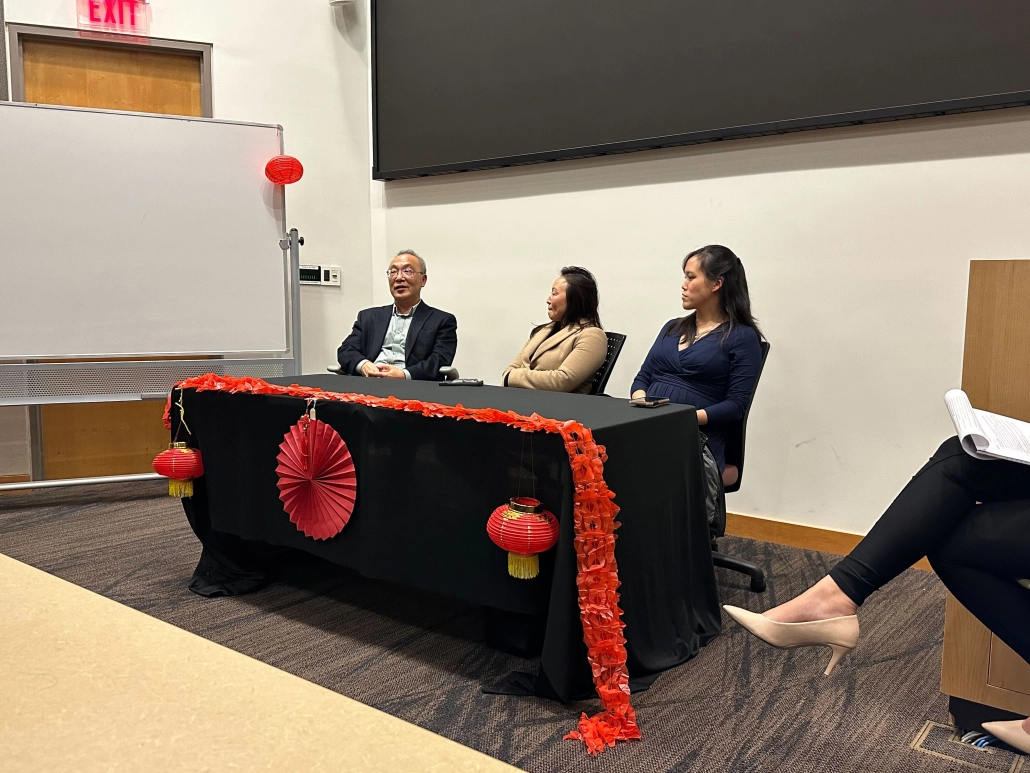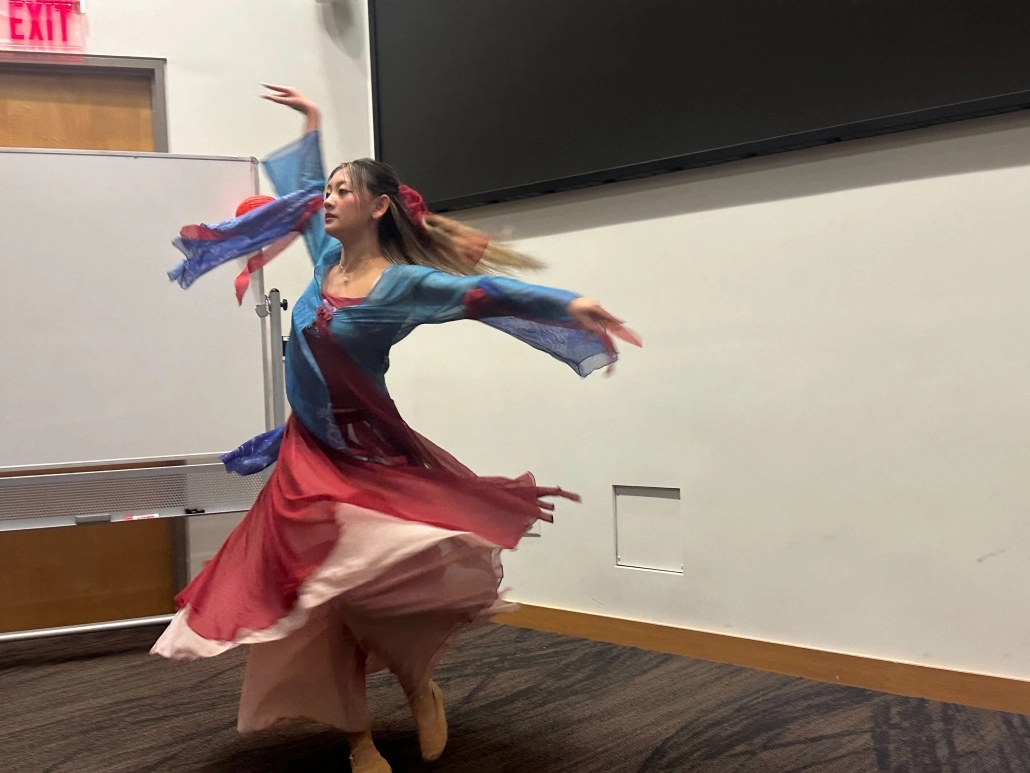Price hosts Lunar New Year celebration
The Cultural Compass event highlighted Asian American and Pacific Islander traditions.
The Cultural Compass event highlighted Asian American and Pacific Islander traditions.

Students and staff celebrated Lunar New Year on Tuesday in the Lewis Hall Greenlaw Auditorium with a panel discussion and dance performances at “A Celebration of AAPI Voices and Lunar New Year,” an event hosted by the Price School of Public Policy intended to highlight Asian American and Pacific Islander voices.
The event was part of a larger series organized by Price in conjunction with the Price Office of Student Affairs, known as the “Cultural Compass” events, which aim to “speak to the holistic parts” of the student experience, said Brittany Buendia-Moralez, the host of the event.
The event series will guide students from a cultural perspective along a journey through the diverse narratives that define USC. The series aims to amplify diverse voices in the community, to inspire students to build a more “inclusive and equitable future” through public policy.
Panelists Alice Chen, Grace Bahng and Shui Yan Tang spoke to their cultural identity and how it shaped their experiences both as students and as educators.
Yan Tang, Duggan professor in public administration and chair of the Department of Public Policy and Management, spoke to the “two narratives” of his life: one a Western perspective and one stemming from his Chinese heritage. Growing up in Hong Kong, Yan Tang said he experienced history lessons from both a Chinese and a British perspective, which introduced him to balancing these different cultural perspectives.
As a first-generation immigrant to the United States, Yan Tang said he felt “caught in the middle” between the Chinese and the Western perspectives on global affairs. Yan Tang said that although it could be difficult for him to balance these two narratives, he maintained it as a career focus, writing books in both Chinese and English discussing issues of public policy based on his experience with the U.S. system.
Chen, associate professor and vice dean for research, said her background as an Asian American woman fundamentally shaped her education pathway.
“I went to college thinking that I would be what most Asian families value, which is being a lawyer or doctor,” Chen said. However, she did not enjoy either of these career paths, and ended up picking a field which combined her interest in research while still incorporating the importance her upbringing placed on advanced degrees.

Bahng, the current vice dean for undergraduate programs and a second-generation Korean American, also discussed how her cultural background influenced her career choice.
Bahng said that her parents experienced troubles from the Korean War, which motivated her to pursue a career studying global poverty with an emphasis on refugees and internally displaced people. She considered this focus “personal” due to her family’s own history with immigration and the Korean War. Now, Bahng works on a more local level, working in community development in Koreatown.
The panelists ended by offering advice to current students who may be struggling with their own cultural identity as Asian Americans in the education space. Alice says that “stereotypically, Asian Americans are known for … not speaking up as much,” and that it’s important to learn how to do this, especially in an education system that values extroversion.
“[It’s important to] be willing to take up space,” said Chen. Chen recommended speaking to professors one-on-one as a way to practice.
Bahng went on to discuss how the U.S. education system ”tends to favor extroverts,” making it difficult for students who don’t conform to this standard.
“Public policy is a collaborative field, and we ask students to collaborate a lot,” said Bahng. She said it’s important in her work to learn how to address and confront “different cultures” and “different learning styles.”
Jocelyn Henriquez Reyes, a graduate student studying urban planning, said the event was a helpful conversation on how to handle educational spaces as a first-generation immigrant.
“I think hearing experience from people who have been students in the past and are even now professors is very helpful,” Reyes said. “It can show you that even though you have these struggles right now, you can still get very far in your career.”
The event ended with a traditional Chinese dance from the Traditional Chinese Dance at USC troupe. Anna Liu, a sophomore majoring in human biology as well as biochemistry, performed as Luo Shen, the water goddess of the Luo River exploring the human world for the first time.
“I think this is a great event to spread awareness about Lunar New Year,” Liu said.
We are the only independent newspaper here at USC, run at every level by students. That means we aren’t tied down by any other interests but those of readers like you: the students, faculty, staff and South Central residents that together make up the USC community.
Independence is a double-edged sword: We have a unique lens into the University’s actions and policies, and can hold powerful figures accountable when others cannot. But that also means our budget is severely limited. We’re already spread thin as we compensate the writers, photographers, artists, designers and editors whose incredible work you see in our daily paper; as we work to revamp and expand our digital presence, we now have additional staff making podcasts, videos, webpages, our first ever magazine and social media content, who are at risk of being unable to receive the support they deserve.
We are therefore indebted to readers like you, who, by supporting us, help keep our paper daily (we are the only remaining college paper on the West Coast that prints every single weekday), independent, free and widely accessible.
Please consider supporting us. Even $1 goes a long way in supporting our work; if you are able, you can also support us with monthly, or even annual, donations. Thank you.
This site uses cookies. By continuing to browse the site, you are agreeing to our use of cookies.
Accept settingsDo Not AcceptWe may request cookies to be set on your device. We use cookies to let us know when you visit our websites, how you interact with us, to enrich your user experience, and to customize your relationship with our website.
Click on the different category headings to find out more. You can also change some of your preferences. Note that blocking some types of cookies may impact your experience on our websites and the services we are able to offer.
These cookies are strictly necessary to provide you with services available through our website and to use some of its features.
Because these cookies are strictly necessary to deliver the website, refusing them will have impact how our site functions. You always can block or delete cookies by changing your browser settings and force blocking all cookies on this website. But this will always prompt you to accept/refuse cookies when revisiting our site.
We fully respect if you want to refuse cookies but to avoid asking you again and again kindly allow us to store a cookie for that. You are free to opt out any time or opt in for other cookies to get a better experience. If you refuse cookies we will remove all set cookies in our domain.
We provide you with a list of stored cookies on your computer in our domain so you can check what we stored. Due to security reasons we are not able to show or modify cookies from other domains. You can check these in your browser security settings.
These cookies collect information that is used either in aggregate form to help us understand how our website is being used or how effective our marketing campaigns are, or to help us customize our website and application for you in order to enhance your experience.
If you do not want that we track your visit to our site you can disable tracking in your browser here:
We also use different external services like Google Webfonts, Google Maps, and external Video providers. Since these providers may collect personal data like your IP address we allow you to block them here. Please be aware that this might heavily reduce the functionality and appearance of our site. Changes will take effect once you reload the page.
Google Webfont Settings:
Google Map Settings:
Google reCaptcha Settings:
Vimeo and Youtube video embeds:
The following cookies are also needed - You can choose if you want to allow them:
